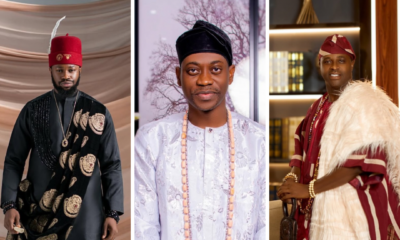Features
Oris Aigbokhaevbolo: Gbomo Gbomo Express – A Confused Jumble of Grit & Glamour
 In 2015, Walter Taylaur’s Gbomo Gbomo Express has inherited that peculiar hand-me-down: the not-your-typical-Nollywood film praise. Earlier films to receive that poisoned chalice include Tango with Me and The Figurine.
In 2015, Walter Taylaur’s Gbomo Gbomo Express has inherited that peculiar hand-me-down: the not-your-typical-Nollywood film praise. Earlier films to receive that poisoned chalice include Tango with Me and The Figurine.
Advance notice was these films will change Nollywood. That they didn’t change Nollywood should make newer films rethink their approach to hype. I can understand the temptation but it is wise to avoid praise of this kind.
Gbomo Gbomo Express, however, wants that praise, craves it – it stops short of demanding it. Nothing wrong with ambition but Taylaur’s film confuses quality with celebrity. The evidence is right there in the opening shot where you hear an awful version of Yemi Alade’s Johnny. Seconds later it is revealed that it is performed by a wannabe singer auditioning for a record label. It is a clever conceit as the scene serves two purposes. One, it shows the character of the label: not too successful, possibly has no great artist signed, and CEO Austin Mba, played by Ramsey Nouah, has an effective bullshit detector.
Also, the scene shows our filmmaker’s celebrity bona fides; he could clear a Yemi Alade song. The first is evidence of filmmaking nous, especially as what it reveals becomes important as the film goes on. The second is disruptive and merely shows Gbomo Gbomo’s true concern. Let’s say that for a film purporting to show true Lagos grit it has too much of an eye on celebrity and glamour.
Gbomo Gbomo Express follows a small-time band of crooks working in a shawarma joint. Francis (Gideon Okeke) is head of the band; the other members are Filo (Gbenro Ajibade) and Blessing (Kiki Omeili). All three actors are members of the swanky new Nollywood sect. Here they are playing low-class citizens serving the upmarket class fast-food and comeuppance.
When we meet them, they are preparing shawarma and scheming something else. Unfortunately, their first act of small-time crookery is unconvincing. The trio steals a phone off one of three ladies. The victim’s husband (Alex Ekubo) is asked for a ransom. He drops the cash at a secret spot. Someone picks it up. Phone now returned, all is well. The scheme is so silly, that the only way it will succeed is if our crooks have laced their product with something other than chicken or beef and served it citywide. The scene is explicable as satire on the foolishness of rich people. But it isn’t though, because it becomes clear as the film progresses that Mr Taylaur, who doubles as screenwriter, is firmly on the side of the wealthy.
Our crooks move on to bigger fish: kidnap record label boss Austin and demand a ransom. On the night of the kidnapping, they get both Austin and Cassandra (Osas Ighodaro), a rich kid with whom he is cavorting. This kidnapping is easy enough for our crooks, but Austin’s company has no money and, mind you, Oga Austin has a plan; his deputy, Rotimi (Blossom Chukwujekwu) has a plan too. Almost every character has a plan and much of the plot in Gbomo Gbomo Express spirals from the idea that hell is other people’s plans.
With a very sure hand, the film uncovers plans undercutting other plans, producing several twists. The more credible twists are the best part of the film, followed by some of its dialogue.
There are also several camera movements. Nollywood has learned to move the camera but like the film’s last twist, most of these movements are half-clever, overcooked and do nothing for the film. The camerawork isn’t remarkable enough to exist for its beauty alone and not subtle enough to serve the story. It is merely another notch on the bedpost of our director’s run-of-the-mill novelty. With each movement, our director shows he’s trying his hands on one thing but his mind is elsewhere. And perilously, the film’s last twist, a needless, ill-thought conceit, doesn’t hold up to casual analysis. Plot-hole specialists will have fun with this one.
Feel free to ignore the pedants. What is more germane about that last twist is how much it shows just whose side our director has taken. Gbomo Gbomo Express is framed as pretty much any kidnapping story is: as class warfare. The haves vs the have-nots. The immediate crime is perpetrated by the have-nots. But look closer and the remote cause is theft by the haves. As someone once noted, ‘Behind every great fortune there is a great crime.’
Not to Taylaur. To him, crooks are crooks — they deserve what’s coming to them, and the high and mighty are saints. They deserve their wealth and wellbeing. This may be reality in today’s Nigeria but in presenting this without question, Gbomo Gbomo Express becomes an immoral piece of cinema. (The film’s turning point is hinged on a super-rich character who may or may not be modelled on Alison Madueke. She loses a few millions but not much else and, as bonus, gets to exact revenge.)
Again, this film’s fidelity to the trappings of wealth tacitly endorses the moneyed divide that separates Nigeria’s social classes while seeking to show Lagos street-hustling. Wealth is not the worst thing to crave or capture in cinema, but Taylaur also wants the gritty, poverty-wreaked aesthetic that in some hands can be beautiful. But as the picture and setting he has chosen can’t quite give his film grit, he chooses the aforementioned clever camerawork. So when it isn’t all showy angles, it is faces filling the screen. Are we peering into their souls? Not exactly. Do those close-ups reveal something about character? Not by a long shot. The closest we receive to astute characterisation is Cassandra’s shoe fetish—which turns into a plot device anyway.
The unstable tone of the film shows in its humour as well. There’s the relatively highbrow humour of conversations between Austin and Cassandra. And there’s the bumbling, face-in-toilet sort provided by Ajibade’s half-baked conman. To my mind only one succeeds within the film. And it is the highbrow one. This tells all we need to know about which side our director has invested his time.
As for the acting, Ighodaro is competent as a drunken brat. She may not even be acting, as she doesn’t have to do much or be less of the moneyed middle class than she is in real life. Ramsey serves us Recent Ramsey who, it must be said, can phone in a good-enough performance. Gideon Okeke, though, is implicated, and it is through him that the trouble with the film is best expressed.
Okeke’s suave guy playing hustler is a little on the nose; he never lets go of a certain self-regard typical of unsure actors playing a character beneath their station. But he shares only a part of the blame. That he is in a film craving grit is a flaw of casting. Were Taylaur and crew truly invested in the rougher edges of Lagos, they may have sought a few unknown faces in the starring line-up, fresh faces audiences can come to free of preconceived notions—say, similar to what C.J Obasi did with O-Town. Instead, they want celebrity and an assurance of box-office returns. So in place of authenticity, we get a reunion of the guys on Tinsel.
Still, Okeke’s turn here, it must be said, is more successful than it was in Steve Gukas‘s A Place in the Stars. But his lack of conviction is palpable. Surely his heart is in the right place. He wants to be great, to be versatile. But at the moment, his acting is stuck on television.
Tinsel is Gideon Okeke’s baggage. Greed and indecision—shown here as wanting to have his gritty cake and eat it with glamour topping—are Walter Taylaur’s. Inevitably, Gbomo Gbomo Express fails both social classes by patronising one and condescending to the other.
This is especially a failure because the rich don’t need patronising—at the end of a bad day they can dab at their tears with wads of cash. The poor, on the other hand, don’t need condescension—they were doing the best they could, way before Taylaur and company showed up, clever camera and shaky script in hand.




















